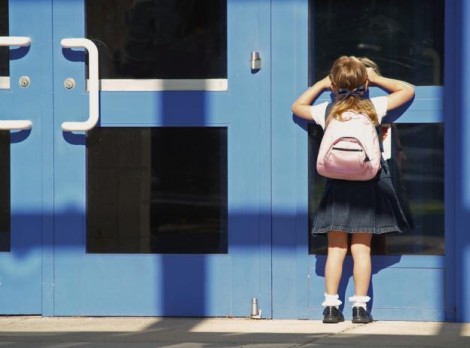I’m terrified.
I have absolutely no idea how I’m going to handle the day my child goes to school for the first time ever. And that day isn’t far off either. Try less than four weeks away...
It feels like just yesterday that she was a teeny little baby all snuggled up in my arms, and now she’s this amazing mini-person who’s going off to school. To her big adventures. And growing up way, way too fast.
 I’m not the only mum whose heart fills up with hope, worry, excitement and sadness at the thought of their child going to school. I think it must be one of the most bittersweet experiences on earth. Amusingly, though, it’s the dads who seem to be quite chilled about it all.
I’m not the only mum whose heart fills up with hope, worry, excitement and sadness at the thought of their child going to school. I think it must be one of the most bittersweet experiences on earth. Amusingly, though, it’s the dads who seem to be quite chilled about it all.
So far, on a poll of about ten dads that I’ve chatted to about this over the past few months, the dads are more of the, “Off ya go! Thaaat’s it!” mindset.
Seeing as I was starting to get more than a little bit jumpy about the whole thing I spoke to Jill Knowles and Sue Twort, Professional Child Counsellors at Childlight. They both specialise in holistic child therapy and offer counselling for children, training for school staff and offer guidance to both parents and teachers. Who better to help us worried parents prepare for, and handle, this situation in such a way that it becomes a wonderful adventure.
They very kindly prepared a list of five top coping tips for parents whose children are starting school for the first time.
1. ESTABLISH A ROUTINE
 Many problems occur because of stress due to such horrors as running late, not being able to find socks, and a child not knowing what to expect. Preparing a routine that you know works in advancewill make life so much easier for you both. At least a week before the first school day, get up each day and wake your child at the time you will need to be getting up for school.
Many problems occur because of stress due to such horrors as running late, not being able to find socks, and a child not knowing what to expect. Preparing a routine that you know works in advancewill make life so much easier for you both. At least a week before the first school day, get up each day and wake your child at the time you will need to be getting up for school.
Washing, dressing and eating breakfast all take time and it will make things run smoothly if you know you will have enough time for all of these. Practise your route to school so that you know how long it takes - traffic is invariably busier on a school day and during bad weather. This may seem like a bit of a chore but time invested now will pay dividends later.
2. PREPARE FOR SCHOOL TOGETHER
 Young children like to know ‘what’s happening?’ and ‘where am I going?’ so in the few days before Day One, walk by the school and look at the building, the gates, the playground and talk about how it might be when s/he is going there every day.
Young children like to know ‘what’s happening?’ and ‘where am I going?’ so in the few days before Day One, walk by the school and look at the building, the gates, the playground and talk about how it might be when s/he is going there every day.
Point out items of interest such as a play house that s/he might look forward to exploring. This familiarisation will enable to you to give reassurance if there are any tears on the first day ‘Remember, we talked about the fun you would have when ....’
If sitting still and listening is not something your child is familiar with, then it will really help if you introduce them to this on a daily basis. Allow them to choose a mat or stool at home to sit on and read them a short piece from a story, encouraging them to listen rather than to interrupt or ask questions until invited to. Start with ten minutes and build up to half an hour.
3. PLAN FOR FEELINGS
 Parents’ reaction is a key factor in how well the settling in process goes. You may be more worried if it is the first child in the family to go to school and sadder if it is the youngest (i.e. the last) to go. Children are very receptive to these feelings and it can start them off feeling anxious and stressed rather than excited and optimistic.
Parents’ reaction is a key factor in how well the settling in process goes. You may be more worried if it is the first child in the family to go to school and sadder if it is the youngest (i.e. the last) to go. Children are very receptive to these feelings and it can start them off feeling anxious and stressed rather than excited and optimistic.
Your child will take their cue from you and so if you seem relaxed and happy, they will too. If you feel anxious or tearful, try to put your own feelings on hold for an hour or two and be positive and upbeat. If you know another parent with a child also starting school, travelling together to give the children a friend to go in with will help them to break the ice.
If they are worried about starting school, spend some time sitting quietly together talking about it or looking at a book about Starting School (see their recommendations below). Allow your child to say if they are worried or scared about school. Avoid saying ‘Don’t be silly’ or ‘you’re a big boy/girl, you’re not scared’. Instead, acknowledge their feelings by saying ‘OK, I understand that you are scared….…’
Reassure your child that school is a good place and there will be lots of fun and new friends to meet. Above all, they will be safe and you will be there at the end of every day to sort out any problems or worries.
 If your child is tearful and clingy when you go to leave them at school, stay calm and determined and do not show that you are upset, even if you feel like howling too! Invariably they will stop crying within seconds of you departing, so leave without looking back.
If your child is tearful and clingy when you go to leave them at school, stay calm and determined and do not show that you are upset, even if you feel like howling too! Invariably they will stop crying within seconds of you departing, so leave without looking back.
If it persists after more than a week, work out a strategy with their teacher, this will not be an uncommon problem for them.
4. MINIMISE DISRUPTIONS AT HOME
 Children often worry about what is going on at home when they are not there, especially if Mum will be alone (and might be missing THEM) or if there is a change in routine, such as Mum starting work for the first time. Try to keep things at home the same for when the child returns after school and put the emphasis on everything being ‘back to normal’ at the end of the day.
Children often worry about what is going on at home when they are not there, especially if Mum will be alone (and might be missing THEM) or if there is a change in routine, such as Mum starting work for the first time. Try to keep things at home the same for when the child returns after school and put the emphasis on everything being ‘back to normal’ at the end of the day.
If you have younger children, try to arrange things so you give the child returning from school some special time when they come home.
If your child is worried about missing you, reassure them that you love them all the time. Plant a kiss on a piece of paper and mark the spot with a big X to be carried in your child’s pocket and taken out whenever they feel upset. If your child thinks youare missing them because you are on your own at home, they are likely to worry about you whilst they are at school.
Be upbeat about your day without them - without being overly ecstatic - whilst showing how glad you are to have them home again.
5. GIVE THEM SPACE
 Children expend a terrific amount of energy when they start school so may be very tired when they come home. It’s a good idea not to bombard them with questions, but just let it come out naturally. They may not have the vocabulary or communication skills to give you a blow-by-blow account of everything that happened from the moment they arrived until they came running out of the school gates, so be open to accepting that they will tell you what they want when they want.
Children expend a terrific amount of energy when they start school so may be very tired when they come home. It’s a good idea not to bombard them with questions, but just let it come out naturally. They may not have the vocabulary or communication skills to give you a blow-by-blow account of everything that happened from the moment they arrived until they came running out of the school gates, so be open to accepting that they will tell you what they want when they want.
If a snippet comes out when you are in the middle of cooking supper, be ready to show interest then and there or you might let it slip away. Keep an eye and an ear open for any problems which they may mention so you can nip them in the bud.
Building a good relationship with the teacher/classroom assistant will show your child that you like and trust them, which will be very reassuring. If you get on well with them it will be easier to raise any concerns you might have in the future, as well as getting valuable feedback about what happens when you’re not there.
 Jill and Sue also recommend books like Charlie & Lola I Am Too Absolutely Small For Schoolby Lauren Child, and Starting Schoolby Janet & Allan Ahlberg.
Jill and Sue also recommend books like Charlie & Lola I Am Too Absolutely Small For Schoolby Lauren Child, and Starting Schoolby Janet & Allan Ahlberg.
I hope that this has helped many of you worried parents out there. I know that some of these really did make me stop, think and breathe a little easier. And, if it is any help at all, I’m right here to offer hugs, tea and sympathy on the big day this September...

















Comments